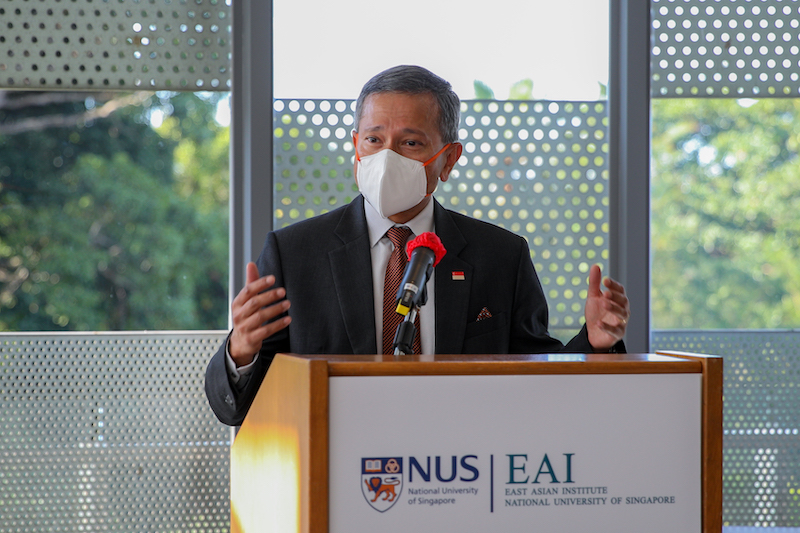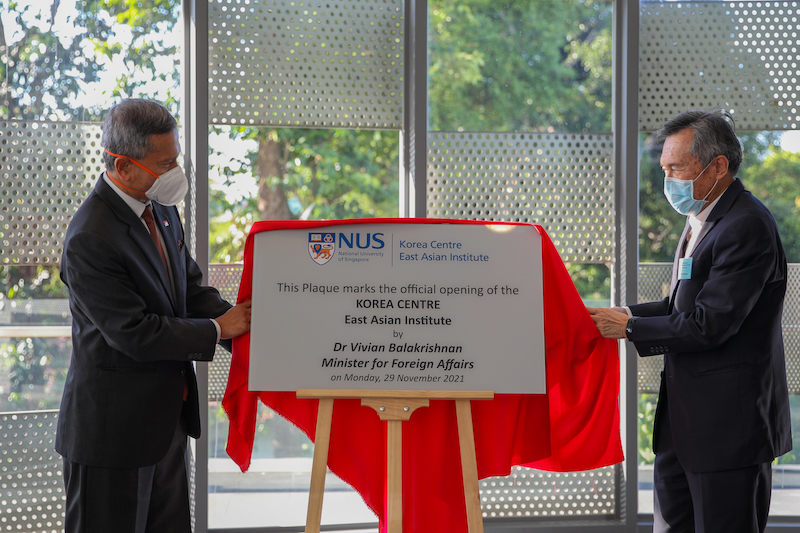Minister for Foreign Affairs Dr Vivian Balakrishnan’s Keynote Speech at the Launch Ceremony of the East Asian Institute’s Korea Centre, 29 November 2021
South Korea
30 November 2021
Distinguished Guests Ladies and Gentlemen 1. Let me first extend my warmest congratulations to East Asian Institute (EAI) Chairman Teh Kok Peng, EAI Director Bert Hofman and Korea Foundat...
This article has been migrated from an earlier version of the site and may display formatting inconsistencies.
Distinguished Guests
Ladies and Gentlemen
1. Let me first extend my warmest congratulations to East Asian Institute (EAI) Chairman Teh Kok Peng, EAI Director Bert Hofman and Korea Foundation President Dr Lee Geun, assisted by the Republic of Korea (ROK) Embassy, on the creation of this new Korea Centre. You are like parents at the point of conception. I think all of us were hoping for COVID babies. I am afraid that really has not happened, but I am glad you all were able to give birth to this academic baby.
2. As Professor Tan Eng Chye, President of NUS (National University of Singapore) recounted just now, this place – (NUS) Bukit Timah campus – is a special place. It was the birthplace of Raffles College, which together with King Edward VII College of Medicine, merged to form the University of Singapore. I entered NUS in 1980, which was incidentally also the year that Nanyang University merged with University of Singapore to become NUS. I still have recollections of that point in time, (when) the Arts faculty was still here, the Law faculty was in Kent Ridge and my Medical faculty was in Sepoy Lines, where today’s Ministry of Health is. The reason for this long story is to tell you that this is sacred ground. As Professor Tan Eng Chye said, this is a birthplace, this is a cradle. This was also a halfway house for the National Institute of Education – my father was a lecturer here – and (this was) also a cradle for SMU (Singapore Management University). This is all very auspicious and therefore, Bert, you have got to make sure that the Korea Centre succeeds. We have given you the best possible start.
3. I should also say that I want to thank Teh Kok Peng for agreeing to be Chairman of EAI. I wanted Bert and the staff of EAI to know that I feel very guilty that this is, in a sense, my first official visit to EAI. I want to assure all of you that your writings and analyses are in fact very well read within Cabinet. PM himself goes through them and highlights and underlines important passages. So, remember that what you think about, discuss, analyse and write down here has impact far beyond an academic campus.
4. The EAI, in the view of the Singapore Government, is a key think tank with a key role to analyse the political, economic and social developments in Northeast Asia. We all know that Northeast Asia is actually a very dynamic, sometimes even volatile place. It has got vibrant economies. It obviously has diverse cultures, and it makes a difference to the world and it makes a difference to Singapore. If you focus on the Korean Peninsula itself, it is a delicate focal point within Northeast Asia. It is home to 77 million people with a very rich historical and cultural heritage with dynamic economic growth and even greater potential for the future. But what makes the story of Korea in a larger sense more fascinating is that history has not been very kind to Korea and the Koreans. It is this human story of survival against the odds, fortitude against great pressure, of ingenuity, of imagination, of hope that in fact makes the story of Korea not only so fascinating to ordinary people who respond to K-drama and K-pop, as Professor Tan has mentioned, but also worthy of academic and political analysis. In a sense, our establishment of the Korea Centre is actually overdue. Again, I want to make the point so that the Korea Foundation will understand that your investment in this centre is worthwhile. So please continue to support Dr Teh and Professor Tan when they come to you in future.
5. Singapore also is glad that we were able to have played a small role in facilitating dialogue and advancing the peace process on the Korean Peninsula. We hosted the inaugural Summit between then-US President Trump and DPRK Chairman of the State Affairs Commission Kim Jong Un when they met in Singapore three years ago in 2018. I must say it also gave me an excuse to visit Pyeongyang. As a Foreign Minister who is fairly well travelled, that was one unforgettable, fascinating trip in its own right.
6. I can tell you categorically that Singapore and the DPRK enjoy formal, cordial, and functional relations, despite the challenges the DPRK itself faces due to its own unique political circumstances. I can tell you also from personal insight, having been there (to Pyeongyang in 2018), I was impressed by what I saw as a modern, clean, well-organised city. One thing which I was watching for and counting was the number of construction cranes because that is usually a good index for construction activity and economic activity. There were signs of growth, maybe not bustling, but there were definitely clear signs of growth. The people I met and spoke to were determined, committed, and motivated to doing better for themselves. But I should also say that it is the most unusual place I have ever visited, the way that they related to each other and the way that they related to us was most unusual. I am making all these points to say that the study of the Korea Centre and of the unique experience and journey of the DPRK, which is not yet over, is well worth studying.
7. Singapore has a close and very warm friendship with the ROK. Ambassador (Choi) can testify to that. I can also say (that) from personal experience with your Foreign Ministers. We celebrated the 45th anniversary of diplomatic relations last year. Bilateral cooperation extends to multiple fields, including traditional sectors such as trade, culture and tourism, as well as in emerging areas like the digital economy and the facilitation of start-ups. Right now, we are working towards a substantial conclusion of the Korea-Singapore Digital Partnership Agreement. This agreement will enable us to further deepen bilateral cooperation in new emerging digital areas, including cross-border data flows, cross-recognition of digital identities and the governance of artificial intelligence – all these are critical areas.
8. In July 2020, the ROK established its first start-up centre in Southeast Asia right here in Singapore, with a focus on fintech and cybersecurity. I believe this could be a channel for even more Korean start-ups and SMEs to plug into the Singapore ecosystem and ultimately expand into our region. The Singapore-ROK Vaccinated Travel Lane, which we launched two weeks ago, fortunately that was in time for President Lee to visit us (for this event) and to do so without serving quarantine. It is clear that there is a level of trust and cooperation and trust and collaboration between the ROK and Singapore, which will allow us to do things effectively and safely, despite a very dynamic and challenging (COVID-19) situation.
9. As far as ASEAN is concerned, ASEAN has got longstanding relations with the ROK. In fact, that was the reason for my last trip to the ROK which was in 2019 for the ASEAN-ROK Commemorative Summit in Busan – a beautiful city which probably many of you have not been to yet. I recall the very good discussions on furthering ASEAN-ROK cooperation in multiple areas including smart cities and trade. We welcome the ROK’s increased engagement of ASEAN, and in particular, recognise the recent ASEAN-ROK Joint Statement on Advancing ASEAN-ROK Cooperation for People-centered Community of Peace and Prosperity. Indeed, there is much scope for even more cooperation in areas such as public health, infrastructure development, smart cities, digitalisation and connectivity. The ROK has shown strong support for ASEAN’s efforts in combatting the COVID-19 pandemic, including its contributions to the COVID-19 ASEAN Response Fund.
10. Ladies and Gentlemen, the point I am trying to make is that the Korean Peninsula remains fascinating, remains complex and well worth the analysis and academic work that the Korea Centre will embark on. We do need a deeper, more nuanced understanding of the intricacies and implications of developments in the Peninsula, and its wider impact on us and the rest of the world.
11. So I am heartened that the EAI has launched the Korea Centre. Your work will be very useful in providing us with insights that we can act on. I look forward to the good work and wish you all every success. Thank you very much.
. . . . .

Photo caption: Minister for Foreign Affairs Dr Vivian Balakrishnan delivering the keynote speech at the launch ceremony of the East Asian Institute’s Korea Centre on 29 November 2021.
Photo credit: Ministry of Foreign Affairs

Photo caption: Minister for Foreign Affairs Dr Vivian Balakrishnan and East Asian Institute Chairman Dr Teh Kok Peng unveiling the signage of the Korea Centre on 29 November 2021.
Photo credit: Ministry of Foreign Affairs
